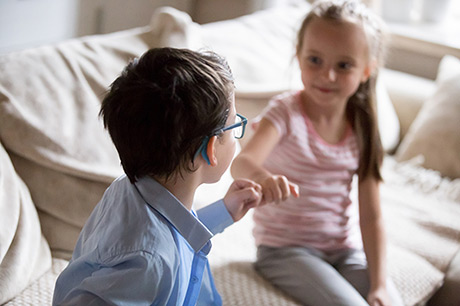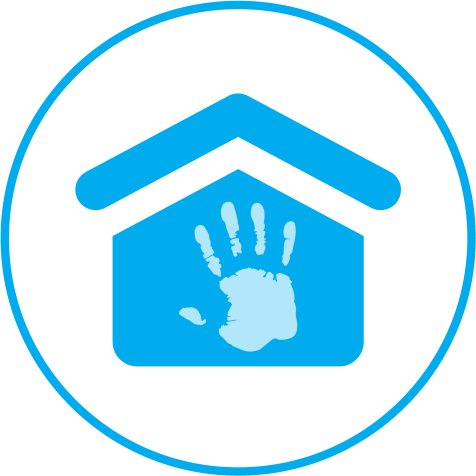Enhancing Sibling Relationships in Families with Kids with Autism
The relationship between siblings is significant in human development. The bond between siblings can provide love and support across a lifetime, and can reinforce social and developmental skills and positive behavior in childhood. Healthy sibling relationships can increase happiness and can contribute to a strong family unit.
Life for an individual with a brother or sister with autism is much like life in any other family. But siblings of kids with autism and similar conditions also face unique challenges. These kids experience a wide variety of emotions and experiences as a result of the situation. Younger kids are sometimes puzzled with questions such as “what is wrong with my brother or sister?” and “why aren’t the rules the same?” Teenagers may display a high level of concern about their brother or sister having a meltdown, especially in public settings. Young adults wonder if they will be the expected to caretake for their brother or sister in the future. All of these questions are important and should be discussed.
When parents are confronted with the intense demand for caring for their child with autism – along with all of the other family and life obligations – they may struggle with understanding when and how to address unique challenges that other children in the family may be facing. Parents can help siblings respond to their experiences of having a brother or sister with autism and can help them develop skills that build and maintain meaningful relationships that can lead to greater balance within the entire family.
Parents need to be aware that it is not easy for many children to express their worries about their brother or sister with autism, so it’s essential that parents foster an atmosphere of open communication, and that they initiate dialogue and provide support. Specialists trained in ABA-based therapy can help facilitate conversations and can provide resources and tools that can help develop strong sibling relationships.
Where to Start:
- One-on-one time: Spending time with your child is a great way to make sure he or she doesn’t get lost in the shuffle of the daily routine and all of the appointments. Start with a few one-on-one activities, they will add up throughout the week.
- Teach your son or daughter about autism: Depending on the age of your child, there are a variety of resources to help children understand autism, including books, support groups, movies, etc. A good starting point is to teach them the word “autism” and what it means. But don’t get caught up with limitations. Keep it short and simple.
- Acknowledge his/her feelings: There has probably been a time when you felt frustrated or embarrassed about a meltdown. Your child may sometimes feel this same kind of frustration or embarrassment. Make it okay for your child to express his/her feelings about all of the ups and down they have with their brother or sister – without the worries of consequences.
- Use positive praise: Don’t forget to praise and give your child attention . . . frequently. Start with the small victories and work your way up. If it doesn’t come easily, try using statements like “I like how you…”, “great job with…” or “it makes me so happy when you…”.
- Have reasonable expectations: Are you perfect? None of us are. Be okay with things not always going according to plan. Kids are going to be kids, they are going to make mistakes, they’re going to misbehave. It’s is all part of the learning process.
- Encourage family activities: Find moments throughout the week to schedule activities that are fun and safe for everyone. Promoting these activities can strengthen relationships with the entire family.
- Support Groups: Sometimes it is comforting to know you aren’t alone or the only one with unique concerns. A sibling support group offers the opportunities for brothers and sisters with a loved one with autism to learn that there are other children they can share and connect with who “get it.” Find out where in your community you can connect.
If you think you need help with a child with autism or his / her sibling or siblings, learn more about in-home ABA services or schedule a complementary 30-minute in-person or phone consultation.
About the Author
Alfredo Arciniega is a bilingual Licensed Marriage & Family Therapist (114063) and a Board-Certified Behavior Analyst. In 2013, he started his career at California Psychcare working with children on the autism spectrum. This is where he discovered his passion to help and support children and their families. He earned two master’s degrees, which contribute to his skillset of providing an integrated treatment approach. His first M.S. degree is from the University of Phoenix and is in Marriage, Family and Child Therapy. The second M.A. degree is from Florida Institute of Technology and is in Professional Behavior Analysis.
Currently, Alfredo is a director of clinical services for the Laguna Hills | Orange County branch of California Psychcare, where he leads a team of behavior interventionists. He lives in Costa Mesa with his husky dog and partner. He takes great pleasure in spending time with his loved ones and enjoys hobbies such as hiking, surfing, and snowboarding. Alfredo hopes to continue to support families by utilizing his background in applied behavior analysis and providing a best practice approach.
Director of Clinical Services
Laguna Hills | Orange County, California Psychcare
Applied Behavior Analysis, or ABA, refers to a variety of treatment options that are based on the principles of behavior analysis. ABA uses scientifically-based techniques for understanding and changing behavior, and is the most widely accepted approach to assess and intervene with individuals with autism spectrum disorder (ASD) or other developmental challenges or delays.



